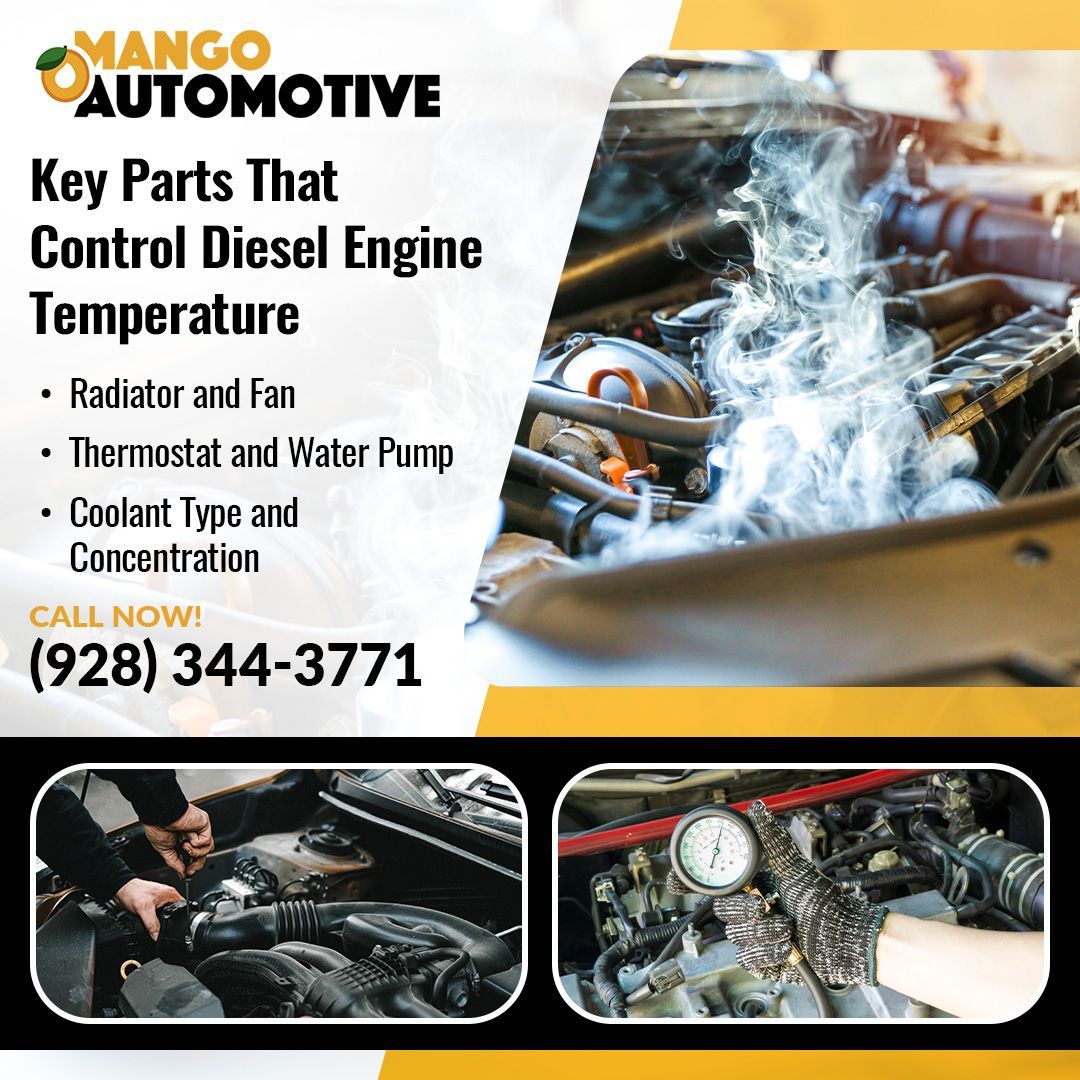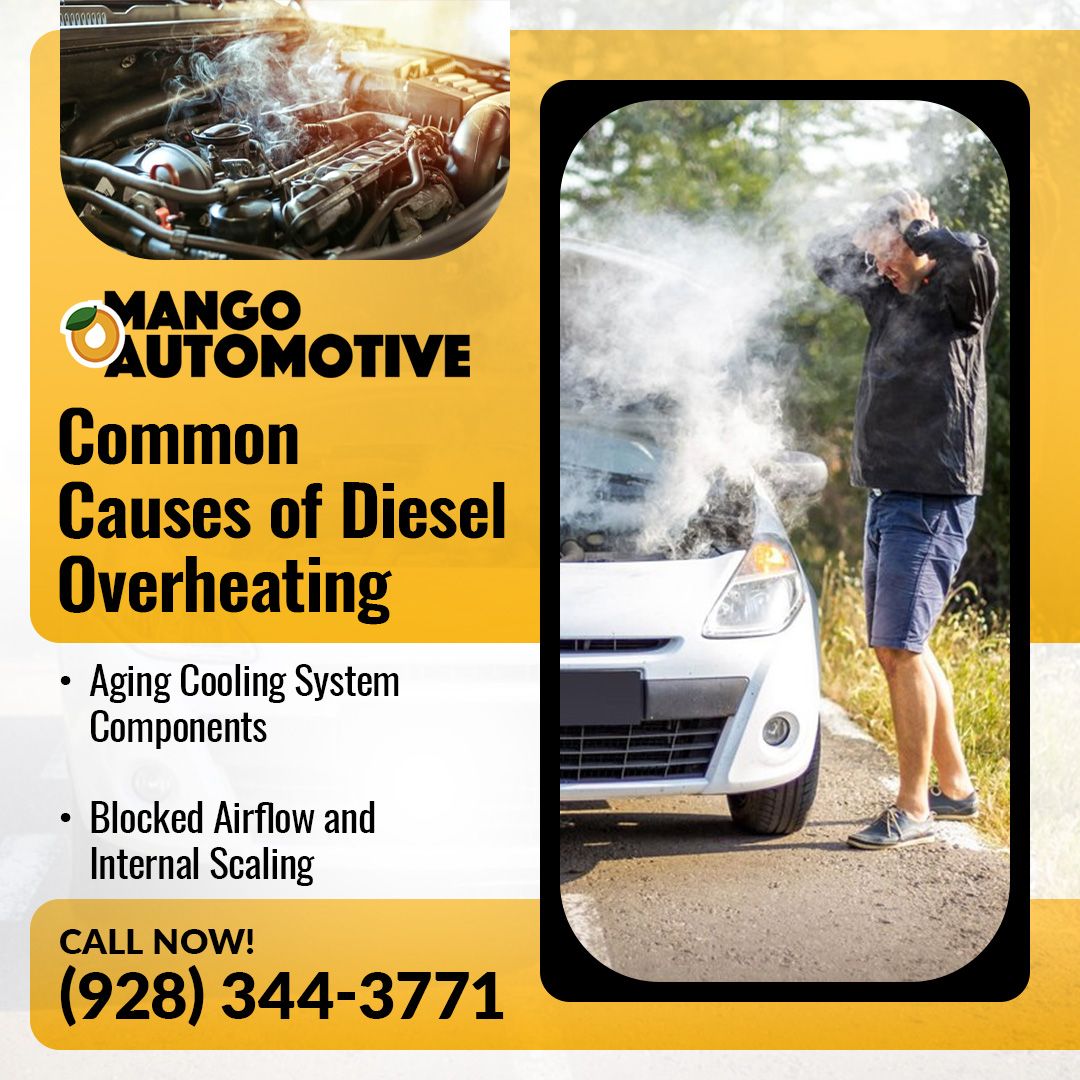Diesel Mechanics in Yuma Explain the Risks of Low-Quality Fuel on Engine Performance
Diesel engines rely on clean, stable fuel to run properly. When diesel fuel is contaminated or poorly refined, it burns less efficiently and creates buildup inside the fuel system. It can damage internal engine components, reduce fuel efficiency, and increase maintenance costs. This weakens performance and causes mechanical issues that can be expensive to repair. At Mango Automotive & Diesel, our diesel mechanics diagnose and repair problems caused by poor-quality fuel. These issues show up in trucks, fleet vehicles, and daily-use diesel engines, especially in regions with high temperatures like Yuma.

What Defines Low-Quality Diesel Fuel
Low-quality diesel fuel is fuel that contains contaminants or lacks proper chemical properties for clean combustion. This includes diesel that has water, dirt, and microbes or does not meet the required cetane rating. Such fuel causes incomplete burning, increases emissions, and reduces power.
In most diesel repair jobs, our mechanics at Mango Automotive & Diesel find that fuel-related problems can be traced to poor storage, infrequent fuel filter replacement, or purchasing from unreliable sources. The impact is often more noticeable in vehicles with sensitive fuel injection systems, such as modern diesel trucks and fleet vehicles.
Common Fuel Contaminants
Common diesel fuel contaminants include water, microbes, sediment, and rust particles. Fuel tanks that are not cleaned or sealed correctly allow moisture and debris to collect. This buildup clogs fuel injectors, damages fuel pumps, and shortens filter life. A diesel mechanic near you can check for these problems during regular service, especially if a vehicle shows signs of poor acceleration or stalling.
Water and Microbial Growth
Water in diesel fuel promotes microbial growth, which damages fuel systems and lowers performance. Bacteria and fungi thrive in fuel systems where water is present. They create slime and acids that corrode fuel lines and tanks. In Yuma’s high heat, water evaporates quickly, but if tanks are not vented or sealed properly, humidity can still lead to condensation and microbial buildup. Regular fuel sampling can identify contamination early.
Dirt, Sediment, and Rust
Dirt, sediment, and rust reduce injector precision and cause wear in fuel system components. These particles are often pulled in from old or unclean storage tanks. Once inside the system, they scratch injector tips and clog filters. Studies suggest that even small particles in the range of 2-3 microns can reduce injector life. At Mango Automotive & Diesel, we recommend regular fuel filter replacement and using trusted fuel sources to reduce the risk of abrasive particles entering the engine.
Low Cetane Rating and Additive Imbalance
Diesel with a low cetane rating burns poorly, causing hard starts, smoke, and sluggish performance. Cetane measures how quickly diesel ignites under pressure. Fuel with low cetane delays combustion, which leads to knocking and poor engine response. The U.S. standard is a minimum cetane rating of 40, but premium fuel is often 45–55.
Additives like lubricity agents and detergents also matter. A lack of additives can lead to wear in the fuel pump and injectors. A skilled diesel mechanic can check for symptoms of cetane and additive imbalance by testing fuel or monitoring engine behavior over time. For diesel drivers looking for long-term reliability, buying high-quality fuel and maintaining the fuel system is as important as regular oil changes.
How Substandard Fuel Affects Engine Components
Substandard diesel fuel shortens the life of engine parts by causing poor lubrication, clogging, and uneven combustion. When fuel contains water, particles, or low cetane levels, it stresses the system. The damage isn’t always instant, but over time, it increases wear, shortens service intervals, and leads to expensive repairs.
Fuel Injectors and Fuel Pumps
Dirty or low-quality diesel clogs injectors and wears out fuel pumps faster. Fuel injectors operate under high pressure and require clean diesel to maintain spray accuracy. Contaminants in fuel can cause injector nozzles to stick or leak.
Fuel pumps rely on diesel not just for power but also for cooling and lubrication. Low lubricity (due to poor additive balance) leads to overheating and scoring of internal pump components. Our diesel mechanics in Yuma often get to replace pumps that fail prematurely because of unfiltered or untreated diesel.
Filters, Seals, and Internal Corrosion
Contaminated diesel clogs filters, breaks down rubber seals, and promotes corrosion in metal parts. Fuel filters block dirt and water before it enters the engine. But when contaminants are heavy, filters clog quickly, restricting flow. The vehicle may hesitate, stall, or show reduced power. If filters are not changed regularly, contaminants bypass them and cause more serious engine damage.
Seals made from rubber or synthetic material degrade faster when exposed to microbial acids or ethanol-blended diesel. These breakdowns often lead to leaks, pressure loss, or fuel odors. Internal corrosion is another major issue, especially in storage tanks or metal fuel lines. Water in diesel encourages rust, which flakes off and enters the system. In time, these flakes damage tight-tolerance components like injectors and pressure regulators.
Combustion Efficiency and Cylinder Health
Poor-quality diesel causes incomplete combustion, which lowers power and damages engine cylinders. Low cetane fuel ignites slowly, creating more soot and smoke. This unburned fuel forms carbon deposits on piston heads, valves, and cylinder walls. Excess carbon can cause piston rings to stick, leading to loss of compression and oil blow-by.
Diesel engines depend on even combustion to maintain cylinder balance. If one cylinder runs cooler or dirtier than the others, it throws off timing and increases vibration. Over time, this imbalance contributes to rough idling, poor acceleration, and even cracked heads.
At Mango Automotive & Diesel, we check for these symptoms when diagnosing power loss or high emissions. Mechanics at our diesel repair shop examine fuel quality and combustion history. In many cases, improving fuel quality and cleaning the system restores full engine function without the need for major engine work.
Warning Signs to Watch For
Contaminated or low-grade diesel can trigger early symptoms of engine trouble that drivers shouldn't ignore. Even small changes in performance may signal fuel-related damage. These signs usually show up in stages, starting with rough idling or smoke and progressing to part failure. These common symptoms are often traced back to bad diesel quality, especially in trucks and work vehicles that refuel at varied locations.
Difficult Engine Starts and Vibration at Idle
Slow cranking, hard starts, or shaking at idle can point to fuel contamination or low cetane. Cold starts are usually the first sign that poor-quality diesel is affecting engine performance. Diesel engines need fuel that ignites reliably under compression. A low cetane rating delays ignition, causing longer crank times or repeated starting attempts.
Once the engine starts, rough idling often follows. Vibration at idle usually comes from uneven fuel burn, clogged injectors, or misfiring in one or more cylinders. This is a top complaint that diesel repair shops see during colder months or after fuel system neglect.
Power Loss and Reduced Acceleration
If your diesel engine feels sluggish or takes longer to accelerate, fuel quality may be the issue. Fuel with high water content or low energy density reduces combustion force. This leads to poor throttle response and lower torque. Clogged filters or injectors also reduce the volume of fuel reaching the cylinders, which weakens performance. For diesel fleet vehicles and work trucks, this reduced power impacts towing, hauling, and overall engine efficiency. It may also cause automatic transmissions to shift differently.
Excess Smoke or Odors from the Exhaust
Thick smoke or a strong fuel smell can indicate incomplete combustion caused by bad fuel. White smoke often means water or unburned diesel is exiting through the exhaust. Black smoke suggests a rich mixture of too much fuel and not enough air. These symptoms are often linked to poor injector spray, improper fuel atomization, or carbon buildup caused by dirty diesel. Smells from the tailpipe, especially sharp or chemical odors, are also signs of poor-quality diesel. These issues not only hurt performance but can lead to failed emissions tests.
Unusual Engine Noises or Warning Lights
Knocking sounds, rattling, or dashboard alerts may be tied to fuel system stress or combustion problems. Knocking or pinging usually means fuel is igniting too late or too unevenly, often due to low cetane or injector issues. Rattling can occur when worn components vibrate under load because fuel isn't combusting evenly. Many diesel trucks have sensors that detect injector timing, exhaust content, or fuel rail pressure. When diesel quality drops, these sensors may trigger engine warning lights.
At Mango Automotive & Diesel, we use advanced diagnostic tools to read these codes and confirm whether bad fuel is behind the alert. Addressing the root issue early often prevents further damage and downtime.
Long-Term Consequences of Poor Fuel Quality
Repeated use of low-quality diesel fuel causes serious damage to engine parts and reduces overall vehicle efficiency. Understanding these long-term effects helps vehicle owners recognize when to seek help from a diesel repair shop.
Shortened Injector Lifespan
Contaminated fuel quickly wears down fuel injectors, causing early failure and costly replacements. Injectors spray diesel into the combustion chamber with precision. Dirt, water, and sediment in poor fuel cause wear on injector nozzles and internal parts. This leads to leaks, poor spray patterns, and uneven fuel delivery.
At Mango Automotive & Diesel, our diesel mechanics can identify and repair injector damage caused by substandard fuel. Replacing injectors prematurely can be expensive, so keeping fuel clean is essential.
Clogged Fuel Lines and Filter Overload
Debris and microbial growth in low-quality diesel clog fuel lines and filters. Filters capture dirt and rust particles, but contaminated fuel causes filters to clog faster than normal. Blocked fuel lines reduce fuel pressure and supply to the engine. This leads to poor performance and frequent filter changes. Vehicles with clogged filters often experience stalling or hesitation during acceleration. A diesel mechanic near you can inspect and replace filters regularly to avoid these problems.
Damage to the Turbocharger or EGR System
Poor fuel can cause carbon buildup and deposits that harm the turbocharger and Exhaust Gas Recirculation (EGR) system. Dirty diesel leaves residue in combustion chambers and exhaust components. This can lead to turbocharger wear and EGR valve blockage. Both affect engine efficiency and emissions control.
At Mango Automotive & Diesel, technicians inspect turbochargers and EGR valves to determine if repair or replacement is required. These components are costly to service, so regular maintenance at a diesel repair shop can help extend their lifespan.
Lower Fuel Economy Over Time
Consistently using substandard diesel reduces miles per gallon and increases fuel costs. Contaminants cause incomplete combustion, forcing the engine to burn more fuel for the same power output. Clogged injectors and filters also reduce efficiency. This drop in fuel economy adds up to higher operational expenses over the months. Maintaining fuel quality supports a better economy and fewer diesel mechanic visits.
Steps to Minimize Fuel-Related Damage
Taking proactive steps can protect your diesel engine from the effects of low-quality fuel and extend its life. Regular maintenance and smart fuel choices are essential to avoid costly repairs. Diesel mechanics recommend several practical actions to minimize fuel-related damage.
Choosing Reputable Fuel Stations
Buying diesel from trusted stations reduces the risk of contaminated or poor-quality fuel. Fuel from reputable suppliers is more likely to meet industry standards and be free from water, dirt, and microbial growth. Look for stations with good turnover and clean tanks. Avoid filling up at lesser-known or remote locations where fuel quality can be inconsistent. This simple choice supports engine health.
Using Preventive Fuel Additives (When Recommended)
Certain fuel additives can improve diesel quality and reduce microbial growth when used appropriately. Additives may include detergents, stabilizers, or biocides that clean fuel systems or inhibit bacteria. However, not all additives suit every engine or fuel type. Consult a diesel mechanic near you to select additives compatible with your vehicle and local fuel conditions. Proper use can reduce injector deposits and filter clogging.
Replacing Fuel Filters at Proper Intervals
Regular fuel filter replacement traps contaminants before they reach critical engine components. Filters remove particles and water that damage injectors and pumps. Over time, filters become saturated and less effective. Follow manufacturer guidelines or advice from a diesel mechanic near you to replace filters on schedule. This routine maintenance avoids blockages and maintains fuel flow.
Scheduling Routine System Inspections with Diesel Mechanics
Regular checks by experienced diesel mechanics detect early signs of fuel-related damage and prevent costly breakdowns. Technicians inspect fuel injectors, pumps, filters, and engine performance to spot issues caused by poor fuel quality. Early intervention improves engine longevity.
At Mango Automotive & Diesel, we provide routine inspections that help customers maintain peak engine conditions and avoid extended downtime. Scheduling these inspections keeps your vehicle reliable.
Diesel Repair Support at Mango Automotive & Diesel
At Mango Automotive & Diesel, we offer expert diesel repair services focused on fuel system issues. With years of experience handling diesel engines, our diesel mechanic team understands the effects of low-quality fuel and how to fix related problems efficiently.
Experience with Fuel System Issues
Our diesel mechanics have extensive experience diagnosing and repairing fuel system damage. From clogged injectors to fuel pump failures, the team is skilled at identifying the root cause and providing reliable repairs. This expertise restores engine performance quickly.
Tools and Processes Used by the Team
Mango Automotive & Diesel uses advanced diagnostic tools and proven repair techniques for diesel fuel system care. We use equipment like fuel pressure testers, injector cleaning machines, and fuel quality analyzers to make sure the diagnosis is accurate. Our repair processes follow manufacturer standards to maintain engine integrity.
Service for Commercial and Light-Duty Diesel Vehicles
Our diesel repair shop services both commercial trucks and light-duty diesel vehicles. Whether you operate a fleet or own a personal diesel pickup, Mango Automotive & Diesel can handle repairs and maintenance tailored to your vehicle’s needs.
What Customers Can Expect During a Visit
Customers receive a clear assessment, transparent pricing, and thorough repairs when visiting Mango Automotive & Diesel. Our team explains findings, discusses repair options, and keeps you informed throughout the process. Scheduling an appointment with our diesel mechanics ensures expert care and long-term engine health.

Contact Mango Automotive & Diesel for Diesel Fuel System Help in Yuma, AZ
Low-quality diesel fuel can cause serious damage to your engine’s performance and lifespan.
Using contaminated or substandard fuel affects key components like injectors, pumps, and filters, leading to poor combustion and increased wear. Recognizing warning signs early helps prevent costly repairs.
Regular maintenance and fuel system inspections by skilled diesel mechanics are essential to protect your vehicle. At Mango Automotive & Diesel, we offer expert repair services designed to address fuel-related issues for both commercial and light-duty diesel vehicles. Taking these steps keeps your engine running efficiently and lowers the risk of breakdowns caused by poor fuel quality.
If you suspect your diesel engine is affected by low-quality fuel, don’t wait for the problem to worsen. Contact Mango Automotive & Diesel today at
(928) 344-3771 to schedule a thorough inspection. Our experienced diesel mechanic team is ready to help keep your engine running smoothly.












